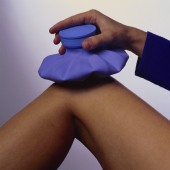- Could Your Grocery Store Meat Be Causing Recurring UTIs?
- Are You Making This Expensive Thermostat Error This Winter?
- Recognizing the Signs of Hypothyroidism
- 10 Strategies to Overcome Insomnia
- Could Artificial Sweeteners Be Aging the Brain Faster?
- Techniques for Soothing Your Nervous System
- Does the Water in Your House Smell Funny? Here’s Why
- Can a Daily Dose of Apple Cider Vinegar Actually Aid Weight Loss?
- 6 Health Beverages That Can Actually Spike Your Blood Sugar
- Treatment Options for Social Anxiety Disorder
Teen ‘Growing Pains’ May Persist For Years


Many teens never outgrow their “growing pains,” according to new research.
Knee pain can persist for years, affecting teens’ participation in sports and other activities, a Danish study found. If left untreated, so-called growing pains can become chronic, the researchers cautioned.
“We can see from the study that one in three young people between the ages of 12 and 19 experience problems with pain in their knees,” said Michael Skovdal Rathleff, a physiotherapist from Aarhus University. “Seven percent of the adolescents experience daily knee pain in the front of the knee. More than half still have problems after two years, so it is not something they necessarily grow out of.”
The study involving 3,000 teens revealed knee pain is a more significant problem than previously thought. Young people with knee pain may stop playing sports because of their discomfort. Without treatment, their quality of life may suffer, the researchers cautioned.
“If knee pain is not treated there is a high risk of the pain becoming chronic. And this clearly has a big consequence for the individual’s everyday life and opportunities,” Rathleff noted in a university news release. “Our findings show that these adolescents have as much pain symptoms and reduced quality of life as adolescents on a waiting list for a cruciate knee ligament reconstruction, or as a 75-year-old six months after receiving a new knee.”
Previous research has shown that about 25 percent of patients who’ve undergone a knee replacement because of osteoarthritis of the kneecap also had knee pain since they were teenagers. Osteoarthritis of the kneecap, the researchers concluded, may sometimes begin early in life. They added, however, that earlier treatment and proper training could help.
Pain resolves with the right training in up to half of the young people with knee pain, according to the study published recently in BMC Pediatrics. But following through on treatment may be a challenge for many teens, the researchers noted.
“It is worrying that the pain only disappears in the case of half of the young people who actually do the training,” said Rathleff. “The indications are that we should start the treatment somewhat earlier where it is easier to cure the pain.”
This doesn’t mean all teens with bad knees must visit a physical therapist, he added. Closer cooperation between physical therapists and general practitioners about how to best help these young people could also be a solution, he said.
More information
The American Academy of Pediatrics provides more information on growing pains.
Source: HealthDay
Copyright © 2026 HealthDay. All rights reserved.










